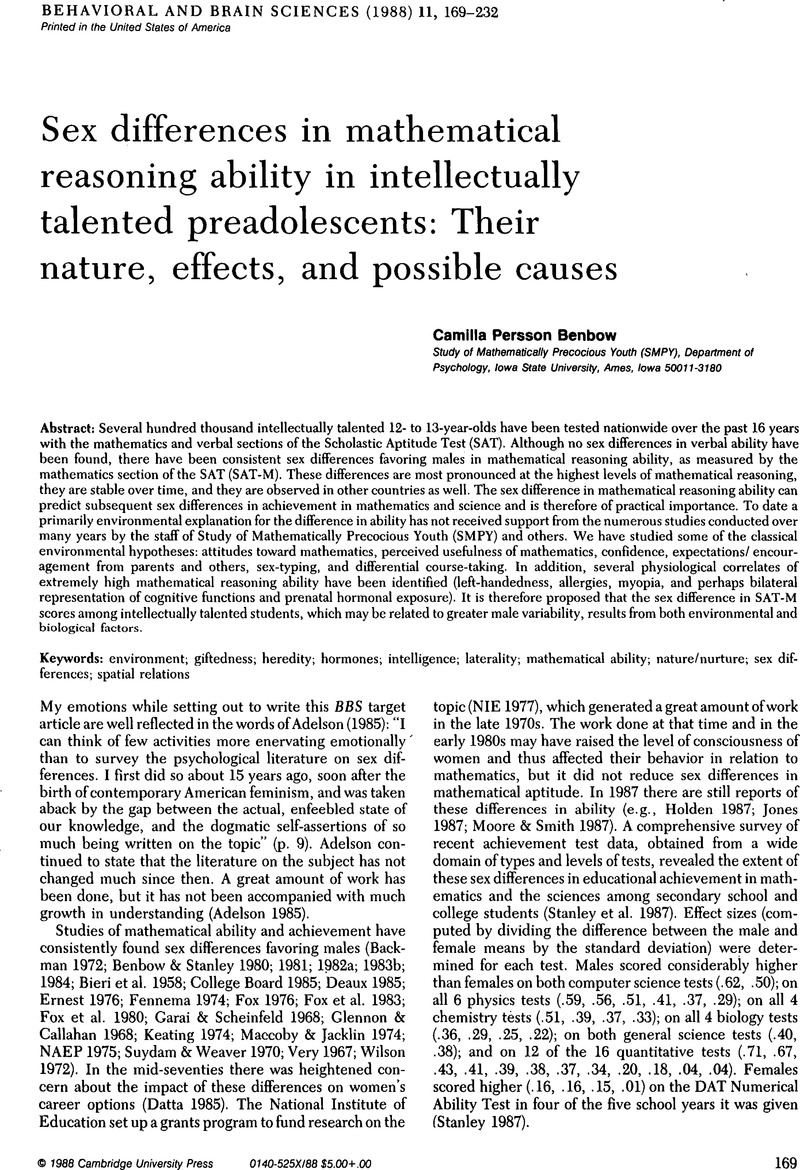Crossref Citations
This article has been cited by the following publications. This list is generated based on data provided by Crossref.
Richardson, Ken
1990.
Go back to cognitive theory.
Behavioral and Brain Sciences,
Vol. 13,
Issue. 1,
p.
193.
Boomsma, Dorret I.
1990.
Does every smart boy have a smart sister?.
Behavioral and Brain Sciences,
Vol. 13,
Issue. 1,
p.
192.
Benbow, Camilla Persson
1990.
Sex differences in mathematical reasoning ability among the intellectually talented: Further thoughts.
Behavioral and Brain Sciences,
Vol. 13,
Issue. 1,
p.
196.
Hoyenga, Katharine Blick
1990.
Some of the pathological assumptions in the sciences of gender.
Behavioral and Brain Sciences,
Vol. 13,
Issue. 1,
p.
194.
Bouchard, Thomas J.
and
Segal, Nancy L.
1990.
Advanced mathematical reasoning ability: A behavioral genetic perspective.
Behavioral and Brain Sciences,
Vol. 13,
Issue. 1,
p.
191.
Eliot, John
1990.
Spatial ability: Not enough space to make a sex difference.
Behavioral and Brain Sciences,
Vol. 13,
Issue. 1,
p.
196.
Petersen, Anne C.
Crockett, Lisa J.
and
Graber, Julia
1990.
Issues in the development of mathematical precocity.
Behavioral and Brain Sciences,
Vol. 13,
Issue. 1,
p.
192.
Rushton, J. Philippe
1990.
Sex, ethnicity, and hormones.
Behavioral and Brain Sciences,
Vol. 13,
Issue. 1,
p.
194.
Borkowski, John G.
1990.
“Small” gender differences on the SAT: A scenario about social origins.
Behavioral and Brain Sciences,
Vol. 13,
Issue. 1,
p.
190.
Thomas, Hoben
1993.
A theory explaining sex differences in high mathematical ability has been around for some time.
Behavioral and Brain Sciences,
Vol. 16,
Issue. 1,
p.
187.
Ghiselin, Michael T.
1996.
Differences in male and female cognitive abilities: Sexual selection or division of labor?.
Behavioral and Brain Sciences,
Vol. 19,
Issue. 2,
p.
254.
Zohar, Ada H.
1996.
Genetic influences on sex differences in outstanding mathematical reasoning ability.
Behavioral and Brain Sciences,
Vol. 19,
Issue. 2,
p.
266.
Feingold, Alan
1996.
On an evolutionary model of sex differences in mathematics: Do the data support the theory?.
Behavioral and Brain Sciences,
Vol. 19,
Issue. 2,
p.
252.
Newcombe, Nora
and
Baenninger, Mary Ann
1996.
Sexual-selection accounts of human characteristics: Just So Stories or scientific hypotheses?.
Behavioral and Brain Sciences,
Vol. 19,
Issue. 2,
p.
259.
Humphreys, Lloyd G.
1996.
A critic with a different perspective.
Behavioral and Brain Sciences,
Vol. 19,
Issue. 2,
p.
257.
Foss, Jeffrey
1996.
Arithmetic and old lace.
Behavioral and Brain Sciences,
Vol. 19,
Issue. 2,
p.
252.
Casey, M. Beth
1996.
Do gender differences in spatial skills mediate gender differences in mathematics among high-ability students?.
Behavioral and Brain Sciences,
Vol. 19,
Issue. 2,
p.
247.
Chipman, Susan F.
1996.
Still far too sexy a topic.
Behavioral and Brain Sciences,
Vol. 19,
Issue. 2,
p.
248.
Davis, Hank
1996.
Is there a comparative psychology of implicit mathematical knowledge?.
Behavioral and Brain Sciences,
Vol. 19,
Issue. 2,
p.
250.
Stanley, Julian C.
and
Stumpf, Heinrich
1996.
Able youths and achievement tests.
Behavioral and Brain Sciences,
Vol. 19,
Issue. 2,
p.
263.



